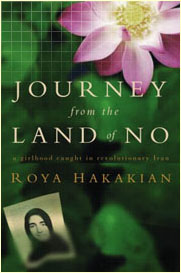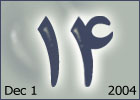Issue 14
Jessica Mondia
Physics student at the university of Toronto

In “A Journey from the land of No,” Roya Hakakian tells the story of her childhood; a young Jewish girl growing up in Iran at the time of the revolution. She speaks of her love of the land, its people and its history. She talks about her home, where the best junipers grew, where poetry was always recited. As a young girl, she was blind to the oppression of the shah and the cruelty of the SAVAK. She talks about an idyllic childhood in which her best friend was Muslim. As the years passed and one brother after another moved to America fearing political persecution, she discovered a new Iran, one which needed change. She was 12 when a revolution shaped by Muslims and Jews alike shook the pillars of Iran’s monarchy. The post-revolutionary Iran was a time for new beginnings, a time which promised both social and political freedoms. Unfortunately, freedom did not last long under the new Islamic fundamentalists. Slowly, both social and political freedoms were prohibited by outlawing music, dance, alcohol, and censorship. The restrictions on women were even greater; they were required to wear “a scarf, a long, loose-fitting overcoat, pants, and closed-toe shoes.” This new social order caused an even larger divide between the Muslims and Jews. Muslims where demanding the return of Jews to Israel. Many Jewish schools were shut down while the ones that remained open were put under the control of conservative Muslims who tried to convert the young minds. Hakakian writes passionately – her sentences flow into each other with a cadence-like musical quality. In her words, you understand the loss of a country which she loves and yet had to flee in order to live her dreams.
Hakakian’s book does not highlight the plight of women in Iran, although she alludes to it by dedicating the book to female political prisoners raped at the hands of their Iranian guards, and ends the book with a chronology of legal reforms passed by the Islamic fundamentalists (such as a ban on female judges and a reversal of the Family Protection Law, so that the age at which a girl could be married was lowered to nine). Her book, however, did reveal the worst trait of a country run by autocratic religious leaders: the inability of those leaders to tolerate different faiths.
It is hard for me to understand the animosity between Jews and Muslims. I was born and raised in Canada, a country which boasts of its multiculturalism. We were taught at a young age to learn about other cultures and respect each other’s differences, and most Canadians follow those principles. I find it hard to understand why the commandments related by Moses, which both the Islam and Torah speak of, do not transcend religions. Thou shalt love thy neighbor as thyself.












